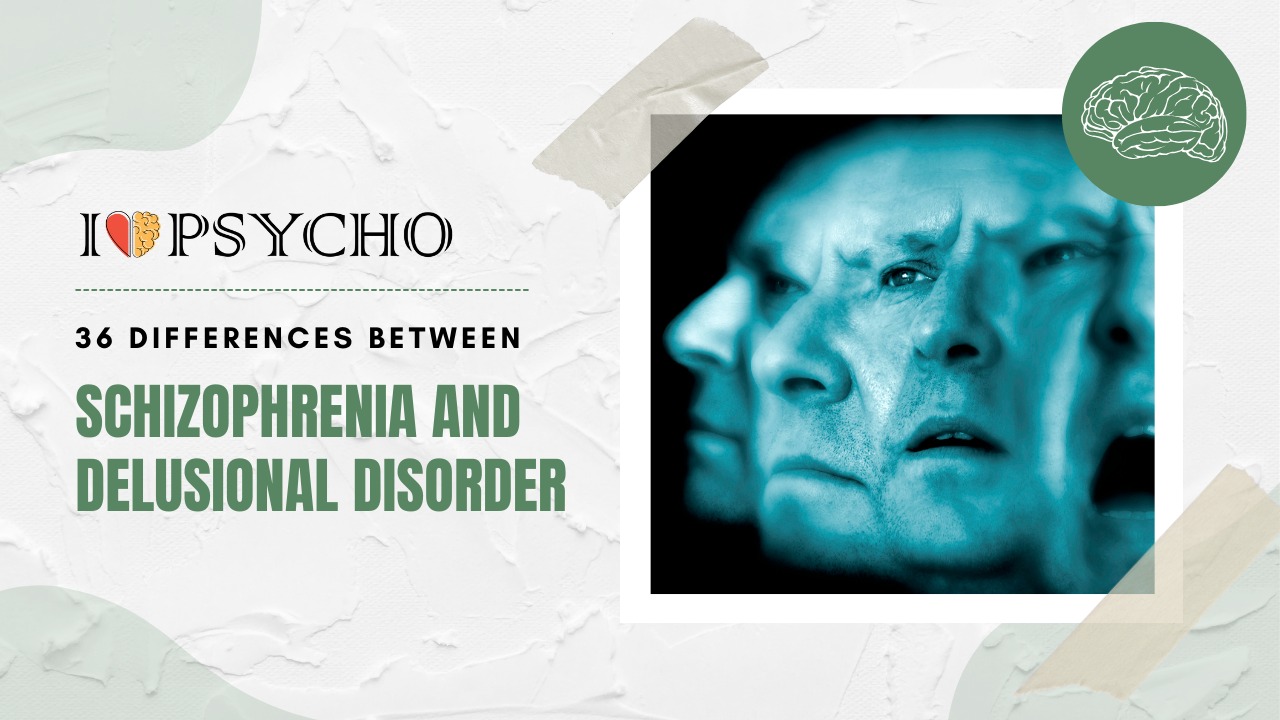Positive, negative, and cognitive symptoms characterize schizophrenia, as a complicated mental condition. Positive symptoms include paranoid or grandiose hallucinations and delusions. Social detachment, flattened emotion, and decreased motivation are negative signs. Cognitive symptoms impact concentration, memory, and decision-making. For diagnosis, schizophrenia needs a combination of these symptoms for at least six months However, Delusional Disorder is characterized by delusions lasting at least one month. Delusional Disorder patients may have normal cognitive, emotional, and behavioral functioning outside of their delusions, unlike schizophrenia patients. Delusions can be non-weird (believable yet wrong) or bizarre. These themes include persecutory (feeling targeted), grandiose (having superior talents), erotomanic (thinking someone loves them), and somatic. Delusional Disorder’s delusions don’t affect other elements of the person’s life.
How much damage and disruption the conditions create is another essential difference. Symptoms of schizophrenia can hinder employment, social connections, and self-care. Exacerbation and remission characterize its chronic course. Delusional Disorder, on the other hand, seldom disrupts work or relationships. Treatments for the two illnesses vary. Antipsychotic drugs may help treat Delusional Disorder, but psychotherapy, including cognitive-behavioral therapy, is more important since it addresses particular delusional ideas.
Schizophrenia and Delusional Disorder both have delusional symptoms, however, they differ in intensity, influence on everyday life, and therapy. Delusional Disorder is characterized by persistent delusions without producing significant impairment, while Schizophrenia has a broader range of symptoms and typically causes more widespread damage. For successful care and assistance targeted to various illnesses, mental health providers must accurately diagnose.
Also Read: 29 Difference Between ADD and ADHD
|
S. No. |
Aspects |
Schizophrenia |
Delusional Disorder |
|
1 |
Definition |
A severe mental disorder characterized by distorted thinking, hallucinations, delusions, and impaired social functioning. |
A mental disorder characterized primarily by the presence of one or more persistent, non-bizarre delusions. |
|
2 |
Onset |
Typically appears in late adolescence or early adulthood. |
Onset can occur at any age but is often later in life (middle to late adulthood). |
|
3 |
Symptoms |
Includes positive (hallucinations, delusions), negative (social withdrawal, emotional flatness), and cognitive symptoms (disorganized thinking). |
Mainly characterized by the presence of delusions; lacks the positive and negative symptoms of schizophrenia. |
|
4 |
Hallucinations |
Common, such as auditory hallucinations (hearing voices). |
Less common, and if present, they are usually related to the primary delusion. |
|
5 |
Delusions |
Present but often not the sole or primary symptom. |
The hallmark symptom, with a single dominant delusion or a few related delusions. |
|
6 |
Disorganized Thinking |
Prominent, leading to impaired thought processes and speech. |
Typically, there is no significant disorganization in thinking or speech. |
|
7 |
Emotional Expression |
May exhibit inappropriate emotional responses (incongruent affect). |
Emotional expression is usually within the expected range. |
|
8 |
Social Functioning |
Marked impairment in social and occupational functioning. |
Social and occupational functioning can be preserved, except in relation to the delusion. |
|
9 |
Course |
Often chronic with recurring episodes and varying severity. |
More stable, with delusions persisting over time with less fluctuation. |
|
10 |
Prognosis |
Generally poorer, with a higher risk of long-term disability. |
Generally better, with a lower risk of long-term disability. |
|
11 |
Subtypes |
Has subtypes such as paranoid, disorganized, catatonic, etc. |
Lacks distinct subtypes like schizophrenia. |
|
12 |
Duration |
Usually continuous or episodic with chronic symptoms. |
Delusions are typically more stable and persistent. |
|
13 |
Insight |
Impaired insight into the illness is common (lack of awareness of being ill). |
Often have good insight into their delusions and recognize them as abnormal. |
|
14 |
Brain Structure |
May show structural brain abnormalities on imaging. |
Less likely to show significant structural brain abnormalities. |
|
15 |
Genetic Factors |
Higher genetic heritability and family history of schizophrenia. |
May have lower genetic heritability and less family history of the disorder. |
|
16 |
Treatment |
Usually requires antipsychotic medications, therapy, and social support. |
Mainly treated with antipsychotic medications; therapy may be less prominent. |
|
17 |
Course Fluctuation |
Symptoms can vary in intensity and may worsen during exacerbations. |
Symptoms tend to remain relatively stable without significant fluctuations. |
|
18 |
Diagnostic Criteria |
Diagnosis is based on the presence of multiple symptoms across different domains. |
Diagnosis is primarily based on the presence of delusions. |
|
19 |
Dopamine Dysregulation |
Often associated with dopamine dysregulation in the brain. |
Dopamine dysregulation may not be as prominent. |
|
20 |
Co-Occurring Disorders |
More likely to have co-occurring disorders such as substance abuse, depression, or anxiety. |
Less likely to have co-occurring disorders, with the focus on the delusion. |
|
21 |
Cognitive Functioning |
Impaired cognitive functioning is common, including memory and attention deficits. |
Cognitive functioning may be relatively preserved, except in areas related to the delusion. |
|
22 |
Reality Testing |
Poor reality testing, with difficulty distinguishing between delusions and reality. |
Generally, good reality testing except in relation to the delusion. |
|
23 |
Response to Medication |
Often responsive to antipsychotic medication, although responses may vary. |
Typically, a good response to antipsychotic medication in relation to the delusion. |
|
24 |
Social Withdrawal |
Commonly leads to significant social isolation and withdrawal. |
Social withdrawal is related to the delusion but not as pervasive. |
|
25 |
Behavioral Disorganization |
May exhibit disorganized or bizarre behavior. |
Behavior is typically not disorganized or bizarre, except in relation to the delusion. |
|
26 |
Catatonia |
Can manifest catatonic symptoms, such as immobility or excessive motor activity. |
Catatonic symptoms are less common and not a defining feature. |
|
27 |
Affect |
Range of emotions can be restricted or inappropriate (e.g., flat affect). |
Emotional expression is generally within the expected range. |
|
28 |
Relational Functioning |
Tends to have impaired relationships due to disorganized thinking and social withdrawal. |
Relational functioning may be relatively preserved, except in relation to the delusion. |
|
29 |
Self-Care |
Impaired self-care and daily living skills are common. |
Self-care and daily living skills may be less impaired. |
|
30 |
Cognitive Impairment |
Widespread cognitive impairment is often present. |
Cognitive impairment is usually limited to areas related to the delusion. |
|
31 |
Environmental Triggers |
Symptoms may be triggered or exacerbated by stressors or environmental factors. |
Symptoms are primarily driven by the delusion rather than external factors. |
|
32 |
Substance Use |
Higher likelihood of substance use as a coping mechanism. |
Less likelihood of substance use as the primary coping mechanism. |
|
33 |
Interference with Reality |
Significant interference with perception and interpretation of reality. |
Interference is primarily related to the delusion. |
|
34 |
Prevalence |
Less common than delusional disorder. |
More common than schizophrenia. |
|
35 |
Suicide Risk |
Higher suicide risk due to the severity of symptoms and hopelessness. |
Lower suicide risk, except when the delusion poses significant life-threatening risks. |
|
36 |
Insight into Illness |
Poor insight into the illness is common. |
Often have good insight into their delusion and recognize it as abnormal. |
Also Read: 42 Difference Between Anxiety and Depression
Frequently Asked Questions (FAQs)
Q.1 What is the main difference between Schizophrenia and Delusional Disorder?
Schizophrenia and Delusional Disorder both entail delusions, although their symptoms and effects differ. These conditions often cause substantial life impairment. Delusional Disorder instead entails persistent delusions for at least one month without schizophrenia’s wide spectrum of symptoms. Importantly, Delusional Disorder patients frequently perform better and retain their cognitive talents.
Q.2 Schizophrenia's positive and negative symptoms?
Positive schizophrenia symptoms include hallucinations and delusions. Negative symptoms include social retreat, emotional inactivity, and decreased motivation. Positive symptoms are disruptive and disturbing, while negative symptoms hinder social and vocational functioning.
Q.3 Can Delusional Disorder impede everyday life?
Delusional Disorder, which is characterized by delusions, seldom impairs everyday living like schizophrenia. Delusional Disorder seldom disrupts work, relationships, or self-care. Their cognitive and emotional abilities are mostly unaffected by delusions.
Q.4 How are these illnesses treated differently?
Schizophrenia treatment often includes antipsychotics, psychotherapy, and psychosocial treatments to improve functioning and avoid relapses. While antipsychotics can help with Delusional Disorder, psychotherapy is more important. CBT is often used to assist people in recognizing and fighting delusional ideas to lessen their influence on daily life.
Q.5 Do these symptoms improve or persist?
Chronic schizophrenia with exacerbations and remissions is common. The chronic course of Delusional Disorder is more stable, yet delusions continue. Continued therapy may help both illnesses control symptoms, enhance functioning, and improve quality of life.









